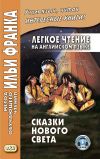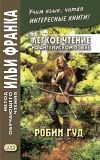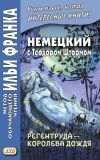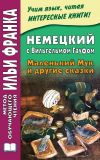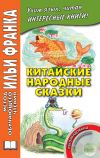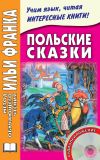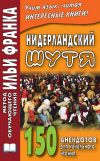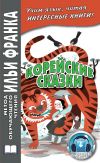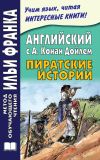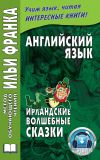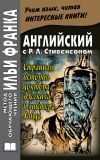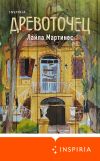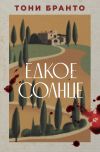Текст книги "Английский с Шерлоком Холмсом. Человек с рассеченной губой / Arthur Conan Doyle. Sherlock Holmes"
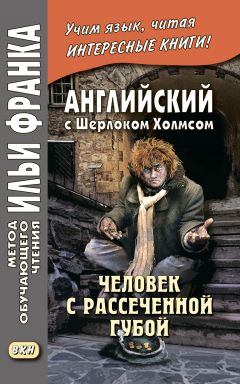
Автор книги: Артур Дойл
Жанр: Иностранные языки, Наука и Образование
Возрастные ограничения: +16
сообщить о неприемлемом содержимом
Текущая страница: 19 (всего у книги 21 страниц)
desultory ['des(ǝ)lt(ǝ)rɪ], financier [f(a)ɪ'nænsɪǝ], thoroughfare ['θʌrǝfeǝ]
Our client appeared to have taken fresh heart at the little glimpse of hope which had been presented to him, and he even broke into a desultory chat with me over his business affairs. A short railway journey and a shorter walk brought us to Fairbank, the modest residence of the great financier.
Fairbank was a good-sized square house of white stone, standing back a little from the road. A double carriage-sweep, with a snow-clad lawn, stretched down in front to two large iron gates which closed the entrance. On the right side was a small wooden thicket, which led into a narrow path between two neat hedges stretching from the road to the kitchen door, and forming the tradesmen's entrance. On the left ran a lane which led to the stables, and was not itself within the grounds at all, being a public, though little used, thoroughfare. Holmes left us standing at the door and walked slowly all round the house, across the front, down the tradesmen's path, and so round by the garden behind into the stable lane.
So long was he that Mr. Holder and I went into the dining-room (его не было так долго, что мы с мистером Холдером вошли в столовую) and waited by the fire until he should return (и принялись ждать, /сев/ у камина, пока он вернется). We were sitting there in silence (мы сидели молча) when the door opened and a young lady came in (как вдруг дверь отворилась, и вошла молодая девушка). She was rather above the middle height (она была немного выше среднего роста), slim (стройная), with dark hair and eyes (с темными волосами и глазами), which seemed the darker against the absolute pallor of her skin (которые казались еще темнее на фоне совершенной бледности ее кожи). I do not think that I have ever seen such deadly paleness in a woman's face (не думаю, что когда-либо видел такую мертвенную бледность женского лица). Her lips, too, were bloodless (ее губы также были совсем побелевшие; bloodless – бескровный, бледный), but her eyes were flushed with crying (а глаза, напротив, покраснели от слез). As she swept silently into the room (когда она тихо вошла в комнату) she impressed me with a greater sense of grief (то поразила меня еще бóльшим ощущением горести = она показалась мне более горюющей) than the banker had done in the morning (чем банкир утром), and it was the more striking in her as she was evidently a woman of strong character (и это было особенно необыкновенно, так как она, по-видимому, была женщиной сильного характера), with immense capacity for self-restraint (и обладала огромным самообладанием: «с огромной способностью к самообладанию»; to restrain – сдерживать; обуздывать). Disregarding my presence (не обращая внимания на мое присутствие), she went straight to her uncle (она подошла сразу к дяде) and passed her hand over his head with a sweet womanly caress (и провела рукой по его волосам с женской нежностью и лаской = нежно, ласково провела рукой по его волосам; caress – ласка; проявление нежности).
height [haɪt], bloodless ['blʌdlɪs], grief [ɡri:f], capacity [kǝ'pæsǝtɪ]
So long was he that Mr. Holder and I went into the dining‑room and waited by the fire until he should return. We were sitting there in silence when the door opened and a young lady came in. She was rather above the middle height, slim, with dark hair and eyes, which seemed the darker against the absolute pallor of her skin. I do not think that I have ever seen such deadly paleness in a woman's face. Her lips, too, were bloodless, but her eyes were flushed with crying. As she swept silently into the room she impressed me with a greater sense of grief than the banker had done in the morning, and it was the more striking in her as she was evidently a woman of strong character, with immense capacity for self-restraint. Disregarding my presence, she went straight to her uncle and passed her hand over his head with a sweet womanly caress.
“You have given orders that Arthur should be liberated (вы распорядились, чтобы Артура освободили; liberty – свобода), have you not, dad (не так ли, папа)?” she asked.
“No, no, my girl, the matter must be probed to the bottom (нет, моя девочка, дело нужно расследовать до конца).”
“But I am so sure that he is innocent (но я уверена, он невиновен). You know what woman's instincts are (вы знаете, что такое женское чутье). I know that he has done no harm (я знаю, что он не сделал ничего дурного; harm – вред; убыток, урон, ущерб) and that you will be sorry for having acted so harshly (и вы пожалеете, что поступили /с ним/ столь сурово).”
“Why is he silent, then, if he is innocent (почему же тогда он молчит, если невиновен)?”
“Who knows (кто знает)? Perhaps because he was so angry that you should suspect him (возможно, потому что очень рассердился, что вы подозреваете его).”
“How could I help suspecting him (как же мне его не подозревать), when I actually saw him with the coronet in his hand (если я действительно видел его с диадемой в руках)?”
“Oh, but he had only picked it up to look at it (ну, он только взял ее, чтобы посмотреть). Oh, do, do take my word for it that he is innocent (о, поверьте мне, он невиновен; to take smb.'s word for it – верить на слово). Let the matter drop and say no more (прекратите это дело, хватит /прошу вас/; to drop – бросать, прекращать; снимать, отменять: to drop charges – снять обвинения). It is so dreadful to think of our dear Arthur in prison (как ужасно думать о том, что наш дорогой Артур в тюрьме)!”
instinct ['ɪnstɪŋkt], suspecting [sǝ'spektɪŋ], prison ['prɪz(ǝ)n]
“You have given orders that Arthur should be liberated, have you not, dad?” she asked.
“No, no, my girl, the matter must be probed to the bottom.”
“But I am so sure that he is innocent. You know what woman's instincts are. I know that he has done no harm and that you will be sorry for having acted so harshly.”
“Why is he silent, then, if he is innocent?”
“Who knows? Perhaps because he was so angry that you should suspect him.”
“How could I help suspecting him, when I actually saw him with the coronet in his hand?”
“Oh, but he had only picked it up to look at it. Oh, do, do take my word for it that he is innocent. Let the matter drop and say no more. It is so dreadful to think of our dear Arthur in prison!”
“I shall never let it drop until the gems are found – never, Mary (я не прекращу дела, пока камни не будут найдены, Мэри)! Your affection for Arthur blinds you as to the awful consequences to me (твоя привязанность к Артуру ослепляет тебя настолько, что ты /забываешь/ об ужасных для меня последствиях). Far from hushing the thing up (я не собираюсь замалчивать это дело; far from – далек от; to hush up – замалчивать, скрывать; замять), I have brought a gentleman down from London to inquire more deeply into it (я пригласил одного джентльмена из Лондона для более тщательного расследования).”
“This gentleman (этого джентльмена)?” she asked, facing round to me (спросила она, поворачиваясь ко мне).
“No, his friend (нет, его друга). He wished us to leave him alone (он захотел, чтобы мы оставили его одного). He is round in the stable lane now (сейчас он идет по дорожке, ведущей к конюшне).”
“The stable lane?” She raised her dark eyebrows (она подняла темные брови). “What can he hope to find there (что он надеется там найти)? Ah! this, I suppose, is he (а вот, полагаю, он сам). I trust, sir, that you will succeed in proving (я надеюсь, сэр, вам удастся доказать), what I feel sure is the truth (в чем я убеждена), that my cousin Arthur is innocent of this crime (что мой кузен Артур невиновен в этом преступлении).”
awful ['ɔ:f(ǝ)l], consequence ['kɒnsɪkwǝns], eyebrow ['aɪbraʋ]
“I shall never let it drop until the gems are found – never, Mary! Your affection for Arthur blinds you as to the awful consequences to me. Far from hushing the thing up, I have brought a gentleman down from London to inquire more deeply into it.”
“This gentleman?” she asked, facing round to me.
“No, his friend. He wished us to leave him alone. He is round in the stable lane now.”
“The stable lane?” She raised her dark eyebrows. “What can he hope to find there? Ah! this, I suppose, is he. I trust, sir, that you will succeed in proving, what I feel sure is the truth, that my cousin Arthur is innocent of this crime.”
“I fully share your opinion (полностью разделяю ваше мнение), and I trust, with you, that we may prove it (и надеюсь, с вашей помощью, мы сможем это доказать),” returned Holmes, going back to the mat to knock the snow from his shoes (ответил Холмс, возвращаясь к половику и стряхивая снег с ботинок). “I believe I have the honor of addressing Miss Mary Holder (полагаю, я имею честь говорить с мисс Мэри Холдер). Might I ask you a question or two (могу я задать вам пару вопросов)?”
“Pray do, sir, if it may help to clear this horrible affair up (конечно, сэр, если это поможет распутать ужасное дело).”
“You heard nothing yourself last night (вы ничего не слышали прошлой ночью)?”
“Nothing, until my uncle here began to speak loudly (ничего, пока мой дядя не начал громко говорить). I heard that, and I came down (я услышала его и спустилась).”
“You shut up the windows and doors the night before (вы закрывали окна и двери накануне вечером). Did you fasten all the windows (вы заперли все окна)?”
“Yes.”
“Were they all fastened this morning (они все были заперты сегодня утром)?”
“Yes.”
prove [pru:v], knock [nɒk], loudly ['laʋdlɪ], fastened ['fɑ:s(ǝ)nd]
“I fully share your opinion, and I trust, with you, that we may prove it,” returned Holmes, going back to the mat to knock the snow from his shoes. “I believe I have the honor of addressing Miss Mary Holder. Might I ask you a question or two?”
“Pray do, sir, if it may help to clear this horrible affair up.”
“You heard nothing yourself last night?”
“Nothing, until my uncle here began to speak loudly. I heard that, and I came down.”
“You shut up the windows and doors the night before. Did you fasten all the windows?”
“Yes.”
“Were they all fastened this morning?”
“Yes.”
“You have a maid who has a sweetheart (у вас работает горничная, у которой есть возлюбленный)? I think that you remarked to your uncle last night (вы говорили дяде вчера вечером) that she had been out to see him (что она вышла повидаться с ним)?”
“Yes, and she was the girl who waited in the drawing-room (да, она была той девушкой, что подавала нам /кофе/ в гостиной; to wait – ждать; прислуживать, обслуживать /за столом и т. п./). And who may have heard uncle's remarks about the coronet (и /была тем/ кто мог слышать замечания дяди о диадеме = как дядя рассказывал о диадеме).”
“I see (понятно). You infer that she may have gone out to tell her sweetheart (вы подразумеваете, что она могла выйти из дома и сообщить /об этом/ своему возлюбленному; to infer – заключать; делать /логический/ вывод; выводить /заключение, следствие из чего-либо/; делать предположение, высказывать догадку), and that the two may have planned the robbery (и они вместе могли спланировать ограбление).”
“But what is the good of all these vague theories (но какой толк от этих всех туманных предположений; vague – расплывчатый),” cried the banker impatiently (нетерпеливо воскликнул банкир; patient – терпеливый), “when I have told you that I saw Arthur with the coronet in his hands (ведь я уже сказал вам, что видел Артура с диадемой в руках)?”
“Wait a little, Mr. Holder (подождите немного, мистер Холдер). We must come back to that (мы к этому /еще/ вернемся). About this girl, Miss Holder (/теперь/ относительно этой девушки, мисс Холдер). You saw her return by the kitchen door, I presume (полагаю, вы видели, как она вернулась через дверь кухни)?”
“Yes; when I went to see if the door was fastened for the night I met her slipping in (да, когда я пошла посмотреть, заперта ли на ночь дверь, я увидела, как она тихо входила; to slip in – прокрасться, незаметно войти; to slip – скользить). I saw the man, too, in the gloom (я также видела в темноте ее поклонника).”
“Do you know him (вы знаете его)?”
sweetheart ['swi:thɑ:t], vague [veɪɡ], impatiently [ɪm'peɪʃ(ǝ)ntlɪ], presume [prɪ'zju:m]
“You have a maid who has a sweetheart? I think that you remarked to your uncle last night that she had been out to see him?”
“Yes, and she was the girl who waited in the drawing‑room. And who may have heard uncle's remarks about the coronet.”
“I see. You infer that she may have gone out to tell her sweetheart, and that the two may have planned the robbery.”
“But what is the good of all these vague theories,” cried the banker impatiently, “when I have told you that I saw Arthur with the coronet in his hands?”
“Wait a little, Mr. Holder. We must come back to that. About this girl, Miss Holder. You saw her return by the kitchen door, I presume?”
“Yes; when I went to see if the door was fastened for the night I met her slipping in. I saw the man, too, in the gloom.”
“Do you know him?”
“Oh, yes! he is the green-grocer who brings our vegetables round (он зеленщик, который приносит нам овощи). His name is Francis Prosper (его зовут Фрэнсис Проспер).”
“He stood (он стоял),” said Holmes, “to the left of the door – that is to say (слева от двери, другими словами), farther up the path than is necessary to reach the door (дальше по дорожке, чем необходимо, чтобы достать до двери)?”
“Yes, he did.”
“And he is a man with a wooden leg (и это человек с деревянной ногой)?”
Something like fear sprang up in the young lady's expressive black eyes (что-то похожее на страх промелькнуло в выразительных черных глазах юной леди).
“Why, you are like a magician (да вы словно волшебник),” said she. “How do you know that (откуда вы это знаете)?” She smiled, but there was no answering smile in Holmes's thin, eager face (она улыбнулась, но на худощавом напряженном лице Холмса не появилось ответной улыбки).
“I should be very glad now to go upstairs (теперь мне бы очень хотелось подняться наверх),” said he. “I shall probably wish to go over the outside of the house again (возможно, мне снова захочется обойти дом; outside – наружная сторона). Perhaps I had better take a look at the lower windows before I go up (быть может, лучше сначала взглянуть на нижние окна, прежде чем подниматься).”
vegetables ['veʤ(ǝ)tǝblz], necessary ['nesǝsǝrɪ], answering ['ɑ:nsǝrɪŋ]
“Oh, yes! he is the green-grocer who brings our vegetables round. His name is Francis Prosper.”
“He stood,” said Holmes, “to the left of the door – that is to say, farther up the path than is necessary to reach the door?”
“Yes, he did.”
“And he is a man with a wooden leg?”
Something like fear sprang up in the young lady's expressive black eyes.
“Why, you are like a magician,” said she. “How do you know that?” She smiled, but there was no answering smile in Holmes's thin, eager face.
“I should be very glad now to go upstairs,” said he. “I shall probably wish to go over the outside of the house again. Perhaps I had better take a look at the lower windows before I go up.”
He walked swiftly round from one to the other (он быстро обошел /первый этаж/, переходя от одного /окна/ к другому), pausing only at the large one which looked from the hall onto the stable lane (остановившись лишь у большого окна гостиной, которое выходило на дорожку, ведущую к конюшне). This he opened and made a very careful examination of the sill with his powerful magnifying lens (он открыл его и очень тщательно осмотрел подоконник с помощью мощной лупы; magnifying lens – лупа; увеличительное стекло; to magnify – увеличивать; усиливать).
“Now we shall go upstairs (теперь пойдемте наверх),” said he at last (сказал он наконец).
The banker's dressing-room was a plainly furnished little chamber (гардеробная банкира представляла собой просто обставленную маленькую комнатку), with a gray carpet (с серым ковром), a large bureau (большим бюро), and a long mirror (и высоким зеркалом). Holmes went to the bureau first and looked hard at the lock (Холмс сначала подошел к бюро и внимательно посмотрел на замок).
“Which key was used to open it (каким ключом его открыли: «какой ключ использовался, чтобы отпереть его»)?” he asked.
“That which my son himself indicated (тем самым, о котором говорил мой сын) – that of the cupboard of the lumber-room (ключом от шкафа в чулане; lumber – ненужные громоздкие вещи; хлам).”
“Have you it here (он у вас здесь)?”
“That is it on the dressing-table (он на туалетном столике).”
pausing ['pɔ:zɪŋ], magnifying ['mæɡnɪfaɪɪŋ], mirror ['mɪrǝ]
He walked swiftly round from one to the other, pausing only at the large one which looked from the hall onto the stable lane. This he opened and made a very careful examination of the sill with his powerful magnifying lens.
“Now we shall go upstairs,” said he at last.
The banker's dressing-room was a plainly furnished little chamber, with a gray carpet, a large bureau, and a long mirror. Holmes went to the bureau first and looked hard at the lock.
“Which key was used to open it?” he asked.
“That which my son himself indicated – that of the cupboard of the lumber-room.”
“Have you it here?”
“That is it on the dressing‑table.”
Sherlock Holmes took it up and opened the bureau (Холмс взял его и открыл бюро).
“It is a noiseless lock (замок бесшумный),” said he. “It is no wonder that it did not wake you (не удивительно, что он вас не разбудил). This case, I presume, contains the coronet (в этом футляре, полагаю, находится диадема; to contain – содержать, вмещать). We must have a look at it (нужно взглянуть на нее).” He opened the case, and taking out the diadem he laid it upon the table (он открыл футляр, достал диадему и положил на стол).
It was a magnificent specimen of the jeweller's art (это был великолепный образец ювелирного искусства), and the thirty-six stones were the finest that I have ever seen (и тридцать шесть камней были прекраснейшими /из камней/, которые я когда-либо видел). At one side of the coronet was a cracked edge (с одной стороны диадемы край был отколот), where a corner holding three gems had been torn away (там, где зубец: «уголок» с тремя бериллами был отломан).
“Now, Mr. Holder,” said Holmes, “here is the corner which corresponds to that (вот зубец, который соответствует тому) which has been so unfortunately lost (что был к несчастью утерян). Might I beg that you will break it off (могу я попросить вас отломить его).”
The banker recoiled in horror (банкир отшатнулся в ужасе; to recoil – отскочить, отпрыгнуть; отпрянуть).
“I should not dream of trying (и не подумаю),” said he.
wonder ['wʌndǝ], magnificent [mæɡ'nɪfɪs(ǝ)nt], specimen ['spesɪmǝn]
Sherlock Holmes took it up and opened the bureau.
“It is a noiseless lock,” said he. “It is no wonder that it did not wake you. This case, I presume, contains the coronet. We must have a look at it.” He opened the case, and taking out the diadem he laid it upon the table.
It was a magnificent specimen of the jeweller's art, and the thirty-six stones were the finest that I have ever seen. At one side of the coronet was a cracked edge, where a corner holding three gems had been torn away.
“Now, Mr. Holder,” said Holmes, “here is the corner which corresponds to that which has been so unfortunately lost. Might I beg that you will break it off.”
The banker recoiled in horror.
“I should not dream of trying,” said he.
“Then I will (тогда я попробую).” Holmes suddenly bent his strength upon it, but without result (Холмс внезапно напряг все силы, но безрезультатно; to bend – сгибать/ся/; приложить /усилия/; направить /энергию/). “I feel it give a little (чувствую, что немного поддается),” said he; “but, though I am exceptionally strong in the fingers (но, хотя у меня исключительно сильные пальцы), it would take me all my time to break it (потребовалось бы много времени, чтобы отломить зубец). An ordinary man could not do it (обычный человек не смог бы этого сделать). Now, what do you think would happen if I did break it, Mr. Holder (как вы думаете, что бы произошло, если бы я действительно отломил его, мистер Холдер)? There would be a noise like a pistol shot (раздался бы треск, /похожий/ на пистолетный выстрел). Do you tell me that all this happened within a few yards of your bed (и вы говорите, что все это произошло в нескольких ярдах от вашей кровати) and that you heard nothing of it (а вы ничего не слышали)?”
“I do not know what to think (даже не знаю, что и думать). It is all dark to me (мне это совершенно непонятно: «темно»).”
“But perhaps it may grow lighter as we go (может быть, все немного прояснится: «станет светлее»). What do you think, Miss Holder (а что вы думаете, мисс Холдер)?”
“I confess that I still share my uncle's perplexity (признаюсь, я по-прежнему разделяю недоумение моего дяди).”
“Your son had no shoes or slippers on when you saw him (ваш сын не был /ли/ в ботинках или туфлях, когда вы его увидели)?”
result [rɪ'zʌlt], exceptionally [ɪk'sepʃ(ǝ)n(ǝ)lɪ], pistol ['pɪstl], perplexity [pǝ'pleksǝtɪ]
“Then I will.” Holmes suddenly bent his strength upon it, but without result. “I feel it give a little,” said he; “but, though I am exceptionally strong in the fingers, it would take me all my time to break it. An ordinary man could not do it. Now, what do you think would happen if I did break it, Mr. Holder? There would be a noise like a pistol shot. Do you tell me that all this happened within a few yards of your bed and that you heard nothing of it?”
“I do not know what to think. It is all dark to me.”
“But perhaps it may grow lighter as we go. What do you think, Miss Holder?”
“I confess that I still share my uncle's perplexity.”
“Your son had no shoes or slippers on when you saw him?”
“He had nothing on save only his trousers and shirt (на нем были только брюки и рубашка).”
“Thank you (благодарю вас). We have certainly been favored with extraordinary luck during this inquiry (в этом расследовании нам сопутствует исключительная удача; to favor – благоволить, быть благосклонным; благоприятствовать; содействовать), and it will be entirely our own fault (и будет целиком наша вина) if we do not succeed in clearing the matter up (если мы не сумеем раскрыть это дело). With your permission, Mr. Holder, I shall now continue my investigations outside (с вашего позволения, мистер Холдер, я продолжу изыскания снаружи).”
He went alone, at his own request (он вышел один, по своей собственной просьбе), for he explained that any unnecessary footmarks might make his task more difficult (поскольку, как он объяснил, лишние следы могут затруднить его работу). For an hour or more he was at work (час или больше Холмс был занят), returning at last with his feet heavy with snow and his features as inscrutable as ever (наконец он вернулся, ноги у него были все в снегу: «тяжелы от снега», а лицо непроницаемо, как обычно).
“I think that I have seen now all that there is to see, Mr. Holder (думаю, теперь я увидел все, что нужно, мистер Холдер),” said he; “I can serve you best by returning to my rooms (и теперь буду вам наиболее полезным, вернувшись домой).”
entirely [ɪn'taɪǝlɪ], request [rɪ'kwest], inscrutable [ɪn'skru:tǝbl]
“He had nothing on save only his trousers and shirt.”
“Thank you. We have certainly been favored with extraordinary luck during this inquiry, and it will be entirely our own fault if we do not succeed in clearing the matter up. With your permission, Mr. Holder, I shall now continue my investigations outside.”
He went alone, at his own request, for he explained that any unnecessary footmarks might make his task more difficult. For an hour or more he was at work, returning at last with his feet heavy with snow and his features as inscrutable as ever.
“I think that I have seen now all that there is to see, Mr. Holder,” said he; “I can serve you best by returning to my rooms.”
“But the gems, Mr. Holmes (но как же камни, мистер Холмс). Where are they (где они)?”
“I cannot tell (не могу сказать).”
The banker wrung his hands (банкир заломил руки /в отчаянии/; to wring – скручивать; заламывать).
“I shall never see them again (я их больше никогда не увижу)!” he cried. “And my son? You give me hopes (а мой сын? вы ведь дали мне надежду)?”
“My opinion is in no way altered (мое мнение никоим образом не изменилось).”
“Then, for God's sake, what was this dark business (тогда, ради Бога, что это за темная история) which was acted in my house last night (произошедшая в моем доме прошлой ночью)?”
“If you can call upon me at my Baker Street rooms to-morrow morning between nine and ten (если вы зайдете ко мне /в квартиру/ на Бейкер-Стрит завтра утром между девятью и десятью) I shall be happy to do what I can to make it clearer (я буду рад сделать все, чтобы прояснить это дело). I understand that you give me carte blanche to act for you (как я понимаю, вы предоставляете мне полную свободу действий в ваших интересах; carte blanche – /франц./ карт-бланш /дословно – «белая карточка», т. е. подписанный незаполненный документ, в который его предъявитель может внести все, что угодно/; полная свобода действий), provided only that I get back the gems (только при условии, что я верну камни; provided that – при условии, если только; в том случае, если; to provide – предоставлять; предусматривать), and that you place no limit on the sum I may draw (и вы не постоите за расходами: «не будете ставить ограничения на сумму, которую я запрошу»; to draw – получать /зарплату, проценты и т. д./; извлекать /доход/; брать /деньги со счета и т. д./; to draw a salary – получать зарплату; to draw a check – выписывать чек).”
gem [ʤem], altered ['ɔ:ltǝd], carte blanche [,kɑ:t'blɑ:nʃ]
“But the gems, Mr. Holmes. Where are they?”
“I cannot tell.”
The banker wrung his hands.
“I shall never see them again!” he cried. “And my son? You give me hopes?”
“My opinion is in no way altered.”
“Then, for God's sake, what was this dark business which was acted in my house last night?”
“If you can call upon me at my Baker Street rooms to-morrow morning between nine and ten I shall be happy to do what I can to make it clearer. I understand that you give me carte blanche to act for you, provided only that I get back the gems, and that you place no limit on the sum I may draw.”
“I would give my fortune to have them back (я отдал бы /все/ состояние, чтобы вернуть их).”
“Very good (прекрасно). I shall look into the matter between this and then (я займусь этим делом на досуге; between this and then – на досуге; между делом). Good-bye; it is just possible that I may have to come over here again before evening (возможно, что мне придется снова вернуться сюда сегодня: «до вечера»).”
It was obvious to me that my companion's mind was now made up about the case (мне было ясно, что мой товарищ уже что-то решил насчет этой истории; to make up one's mind – принять решение, решиться /на что-либо/), although what his conclusions were was more than I could even dimly imagine (хотя какими были его выводы, я даже смутно представить не мог). Several times during our homeward journey I endeavored to sound him upon the point (несколько раз на обратном пути я пытался прозондировать его на эту тему; homeward – ведущий, идущий к дому; обратный /о пути/; to sound – осторожно выяснять, зондировать, выспрашивать; sound – зонд, щуп), but he always glided away to some other topic (но он каждый раз менял предмет разговора; to glide – скользить; двигаться плавно, бесшумно; незаметно, постепенно переходить /в какое-либо состояние/), until at last I gave it over in despair (пока наконец я не бросил попытки в отчаянии). It was not yet three when we found ourselves in our rooms once more (еще не было трех часов, когда мы снова были дома). He hurried to his chamber (он поспешил в свою комнату) and was down again in a few minutes dressed as a common loafer (и через несколько минут появился вновь, одетый как обыкновенный бродяга; loafer – бездельник; попрошайка, бродяга; to loaf /about, around/ – проводить время в безделье; бездельничать; зря терять время). With his collar turned up (с поднятым воротником), his shiny, seedy coat (в потрепанном старом пальто; shiny – яркий, блестящий; залоснившийся, потертый; seedy – изношенный, старый, потрепанный), his red cravat (с красным шарфом; cravat – галстук; шарф), and his worn boots (в стоптанных ботинках), he was a perfect sample of the class (он являл собой превосходный образец бродяги/выглядел, как типичнейший бродяга).
fortune ['fɔ:ʧ(ǝ)n], although [ɔ:l'ðǝʋ], collar ['kɒlǝ]
“I would give my fortune to have them back.”
“Very good. I shall look into the matter between this and then. Good‑bye; it is just possible that I may have to come over here again before evening.”
It was obvious to me that my companion's mind was now made up about the case, although what his conclusions were was more than I could even dimly imagine. Several times during our homeward journey I endeavored to sound him upon the point, but he always glided away to some other topic, until at last I gave it over in despair. It was not yet three when we found ourselves in our rooms once more. He hurried to his chamber and was down again in a few minutes dressed as a common loafer. With his collar turned up, his shiny, seedy coat, his red cravat, and his worn boots, he was a perfect sample of the class.
“I think that this should do (думаю, так сойдет),” said he, glancing into the glass above the fireplace (сказал он, взглянув в зеркало над камином). “I only wish that you could come with me, Watson (я хотел бы взять вас с собой, Ватсон), but I fear that it won't do (но, боюсь, ничего не выйдет). I may be on the trail in this matter (на верном ли я пути), or I may be following a will-o'-the-wisp (или преследую недостижимую цель; will-o'-the-wisp – блуждающий огонек /на болоте/; обманчивая надежда, нечто неуловимое), but I shall soon know which it is (скоро я это выясню). I hope that I may be back in a few hours (надеюсь, вернусь через несколько часов).” He cut a slice of beef from the joint upon the sideboard (он отрезал немного говядины от куска, /лежавшего/ на буфете; slice – ломоть; ломтик; joint – сустав; мясной отруб; a joint of meat – кусок мяса), sandwiched it between two rounds of bread (положил ее между двумя ломтями хлеба), and thrusting this rude meal into his pocket (и, сунув эту незатейливую пищу в карман; rude – грубый; примитивный) he started off upon his expedition (отправился выполнять миссию: «в свою вылазку»).
Правообладателям!
Это произведение, предположительно, находится в статусе 'public domain'. Если это не так и размещение материала нарушает чьи-либо права, то сообщите нам об этом.